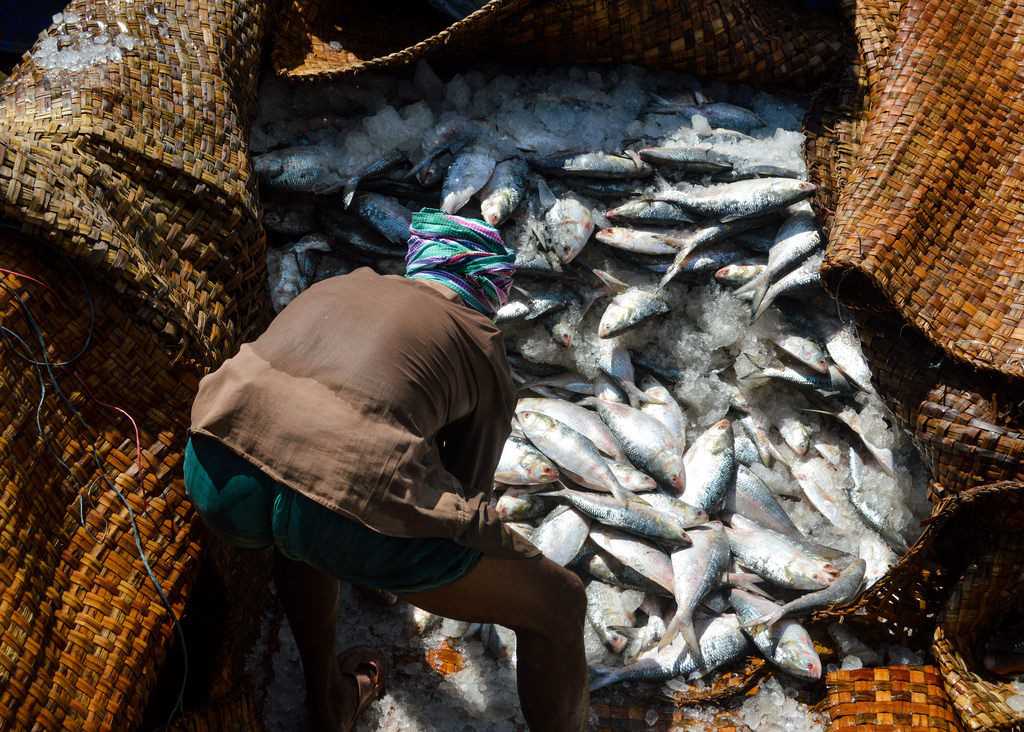Bangladesh saves its favourite fish

Gone are those days when Sharmin Rahman used to worry about getting Hilsa to treat her guests. She now finds the national fish of Bangladesh almost round the year.
“Just a few years ago, I had often to buy other fish as there was hardly any Hilsa available in the market. But now I get the fish almost every time,” said the homemaker from Mirpur in Dhaka.
The favourite fish of Bengalis, the Hilsa is an integral part of the Bangladesh’s culture and heritage. Be it fried or cooked with mustard, Hilsa is a must in many celebrations including Pahela Baishakh, the first day of Bengali New Year.
Thanks to conservation efforts taken by the government in the last several years, the production of Hilsa has increased manifold. The government now puts more focus on Hilsa research and improving the livelihood of the fishermen. It is now framing a policy to provide the fishermen with life insurance, micro-credit and compensation.
Narayon Chandra Chanda, minister of ministry of fisheries and livestock, told thethirdpole.net, “We are now focusing more on how we can improve our conservation initiative – which method will be more sustainable and how we can maximise benefits.”
He also said the government is in regular contact with neighbouring India over the Hilsa conservation issue. “In July we had a meeting with the West Bengal Fisheries Department and we agreed that we will do some research jointly.”
But the story was rather a sad one two decades ago.
The availability of Hilsa in the country fell drastically in the early 1990s due to the impact of climate change, overfishing of brood Hilsa and reduction in water flow in the once-mighty rivers of the Bengal delta.
Whereas this particular species of fish was found in as many as 50 rivers of the country even three decades ago, it is now available in 10 rivers only, according to the officials of the Department of Fisheries (DoF).
But the government’s interventions, including imposing a ban on fishing jatka (Hilsa less than 10 inches long) and mother Hilsa for eight months, and declaring five coastal sites as Hilsa sanctuaries have yielded positive results.
More than half a million coastal fishers directly depend on the Hilsa for their livelihood and nearly three million people of Bangladesh are involved in its trading, processing, transportation and marketing.
To help enforce the ban, the government provides compensation to the fishing communities under a social safety net programme.
Basir Majhi, a fisherman in Tulatuli Ghat in Bhola, one of the largest Hilsa yielding spots in Bangladesh, said, “The ban on fishing Hilsa for 28 days increases Hilsa production but the government must increase the monitoring mechanism to stop catching jatka in order to increase the production further.”
He also said the fishers would not catch jatka if they were compensated “properly”.
A successful initiative
Hilsa production in Bangladesh dropped to 199,000 tonnes in the 2002-03 season, creating a nationwide crisis.
Amid fears of a depletion of Hilsa stock in the near future, the Bangladesh government took up a project in 2004 to conserve jatka. Initially, raising awareness and dissuading fishers from catching brood Hilsa was the target.
To bolster its efforts, it also declared five coastal sites as Hilsa sanctuaries and slapped a ban on fishing jatka and mother Hilsa for eight months between November and June from the 2007-08 season.
Four such zones are: a 100-km stretch of the Meghna from Shatnol in Chandpur to Char Alexander in Laximpur, a 90-km stretch of the Shahbazpur tributary of the Meghna from Madanpur/Char Ilisha to Char Piyal in Bhola, a 100-km stretch of the Tetulia from Bhola’s Bheduria to Patuakhali’s Char Rustam, and a 20-km stretch of the lower Padma in Naria-Bhedorganj of Shariatpur. Apart from the eight-month-long ban on catching hilsa and jatka, all kinds of fishing are prohibited in these zones between March and April.
Source: https://www.eco-business.com
Tags :
Previous Story
- China's Dezhou signs MoUs with Bangladesh to boost...
- Bangladesh to eject safety inspectors brought in after...
- Bourse regulators not doing their job
- Dhaka stocks inch up for 2nd day amid...
- Google just found malware apps hiding in the...
- Using microcredit to increase rice yield in Bangladesh
- India-Bangladesh To Start Cruise Tourism Via Picturesque Sunderbans
- Shakil Rizvi new president of DSE brokers’ assoc